 In my last post, I linked to an article titled, “Simple Tips for Beautiful Writing” that emphasized the importance of editing, proofreading, and generally aiming toward error-free writing. It may seem like a stretch to associate the technical side of writing with beauty, but in reality it is the very substance of beautiful writing. This is the same thing I emphasize when I am teaching my piano students. The technical exercises that they are drilling into their finger muscles form the basis from which beautiful and artistic melodies will flow. If they don’t master the principles of music and understand the underlying absolutes that govern the world of music, the sound they create will be lifeless. An excerpt from another article I recently wrote seems appropriate:
In my last post, I linked to an article titled, “Simple Tips for Beautiful Writing” that emphasized the importance of editing, proofreading, and generally aiming toward error-free writing. It may seem like a stretch to associate the technical side of writing with beauty, but in reality it is the very substance of beautiful writing. This is the same thing I emphasize when I am teaching my piano students. The technical exercises that they are drilling into their finger muscles form the basis from which beautiful and artistic melodies will flow. If they don’t master the principles of music and understand the underlying absolutes that govern the world of music, the sound they create will be lifeless. An excerpt from another article I recently wrote seems appropriate:
In his book, The Piano Shop on the Left Bank, Thad Carhart recounts a master class he observed in which Gyorgy Sebok responded to a student who was trying to achieve a particular effect in his playing, “Leonardo spent years developing a codex of body parts. He drew ears, he drew elbows, he drew hands, he drew all parts of the body in as many different aspects as he could. Then he forgot about it and painted what he saw. You must do somewhat the same.” We err when we fail to learn the parts in our impatient quest to become experts of the whole.
I think one of the major problems with the way most education is conducted today is that it is so results-oriented that students are expected to immediately assimilate information and produce a finished product even though they haven’t been given the time or opportunity to develop specific skills. As a teacher, I have to be able to see the “whole” and then break it down into a systematic and progressive collection of “parts” so that the student is led to master the skills that will eventually form the substance of a beautiful “whole.”
 Let me give a specific illustration. One of my piano students is very expressive and loves to incorporate lots of impulsive nuances into his playing. The only problem is that the nuances distort the natural flow of the phrases and result in inaccurate rhythms. As his teacher, I visualize for him an end result of musical and artistic piano playing that will be lovely to listen to (which is also what he wants). However, I know that the elements that contribute to this include: precise execution of rhythmic values, natural ebb and flow of the phrasing, well-chosen fingering, and fluidity. So I pick one of these elements, in this case the phrasing. We work to understand the principles that govern phrasing – musical phrases tend to swell in volume as the notes rise and decrease in volume as the notes descend. Random notes should not be accented at will because this interrupts the flow of the phrase. Once this principle is understood, we reinforce it by applying it to all the musical assignments that week. Following weeks lend themselves to other areas of understanding and emphasis.
Let me give a specific illustration. One of my piano students is very expressive and loves to incorporate lots of impulsive nuances into his playing. The only problem is that the nuances distort the natural flow of the phrases and result in inaccurate rhythms. As his teacher, I visualize for him an end result of musical and artistic piano playing that will be lovely to listen to (which is also what he wants). However, I know that the elements that contribute to this include: precise execution of rhythmic values, natural ebb and flow of the phrasing, well-chosen fingering, and fluidity. So I pick one of these elements, in this case the phrasing. We work to understand the principles that govern phrasing – musical phrases tend to swell in volume as the notes rise and decrease in volume as the notes descend. Random notes should not be accented at will because this interrupts the flow of the phrase. Once this principle is understood, we reinforce it by applying it to all the musical assignments that week. Following weeks lend themselves to other areas of understanding and emphasis.
The same principle applies in other areas of study. Take writing, for example. If the end goal is to pen thoughtful, engaging articles addressing relevant topics, one must consider the parts that will contribute to this whole and plan an appropriate course of study. Perhaps a span of time will be given to constructing attention-grabbing introductions, or effective use of analogies and metaphors, or appropriate incorporation of authoritative quotes, etc. Of course, many curricula are designed to aid in this process, but the creative and resourceful teacher may make use of a great many easily accessible resources and ideas to aid a student in achieving the desired end. The key, I believe, is to maintain a thoughtful perspective. Be ever conscious of the overarching objective. And then be patient in outlining and working toward the development of specific parts/skills that will eventually see that objective met.
Just as a gardener who longs for a beautiful bed of flowers must first prepare the ground, then plant the seeds, and then tend the growing buds, before his dream is realized, a teacher or parent who hopes for shining students must first cultivate the ground of understanding, then plant seeds of carefully-designed instruction, and then patiently tend to and guide the emerging musician or writer or scientist as they advance through stages of growth and develop the parts that are ultimately the substance of the whole. That, it turns out, is the necessary, though oft-neglected, path of a beautiful education!

Joe says
One problem is with all of the mandatory testing that goes on, I think the schools teach so they score high on the test. That’s all they care about. Schools are graded against each other, and everyone wants to be the best on the test. Then there is the SAT/ACT test. There are books and books that cover what might be on the test. So students just try and learn all that stuff in hopes they get a good test score.
Then you have the piles and piles of paperwork the teachers are required to complete. Grading, student plans, etc. etc. Every day, every class, the first few minutes are ATTENDENCE! Teachers don’t have time to teach the students. If the student is a fast learner, and can learn the concept on the first pass, they will do well. Those who do not learn as quickly will not do as well. There is probably no time to go back and teach that student again, and so he will just start falling further and further behind.
Finally, many schools have eliminated or drastically reduced art, music, P.E., and recess / rest. Our society does not value artists, musicians, etc. very highly. So those students who have artistic talents will not be able to express those talents, and probably will not excel in the things the schools do offer. As for PE and some rest time, the removal of those has made school for some just a terrible place to be. Personally, I hated school, and was glad that I was able to graduate early. It just isn’t that enjoyable.
The worst part, is that everything is BY DESIGN. The public education system is DESIGNED to produce uneducated adults.
It is much easier for government to rule over minions if the minions are uneducated and uninformed. Just ask North Korea.
Julia says
Love the site design. Anyway, I found this an interesting post, as I prepare myself to teach my children in the not very distant future. Mastering the parts is so important! What good is it to make it through the math book if the concepts aren’t really understood? And for myself as a writer, I was challenged to pursue better mastery of my skills. Great stuff, Natalie.
Margaret says
This is lovely! I have a child who so wants to master the whole without bothering with the boring parts. You may have given me some good talking points to help him.